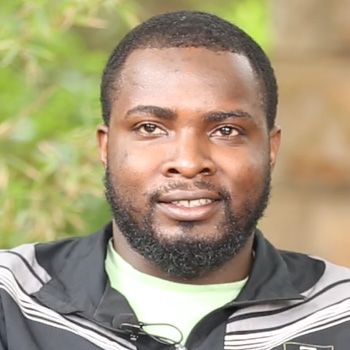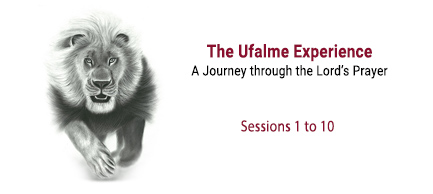Back to series
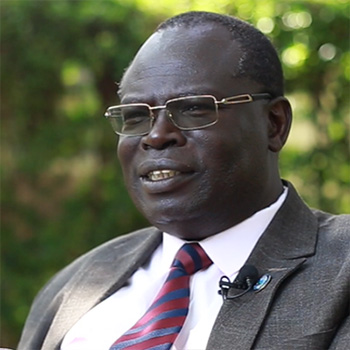

Read and reflect on the following article by Rev. Dr. Robert Langat
(Download this article as a PDF).
The Prodigal Son
The story of the prodigal son is one of the most redemptive stories that can be found.
There is a young man who through his poor choices loses everything. He rebels against his father and runs away from his home, his family, and his people. This son engages in wild and selfish living and ends up experiencing the pain of sin, total poverty, and separation from his father. The son finds himself in a distant land, starving, and yearning for anything good to eat. In this distant land the son works, but the Bible says “no one gave him anything.''
The rebellious son now lives among pigs, and he has become their servant. The Jews viewed pigs as unclean animals, unfit to eat, and even defiling to those who touch them. And now this young man spends his days cleaning up after pigs. Because of his rebellion, the boy has exchanged his dignity, his freedom, and even his identity as a son. He has ruined his life and become like an outcast, totally separated from all that is good.
Separated from the Father
Now you may think that you’ve never behaved like the prodigal son, but I want to tell you that there is a younger son in all of us. In fact the world we live in is in a state of rebellion against God. Each of us is born into sin, rejecting God and His ways, and living in selfishness.
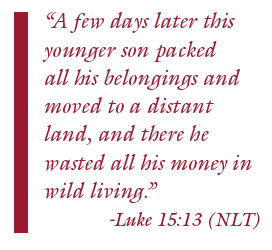 In the parable the son asked for his inheritance early. This young man was saying to his father, I don’t want you or your rules. Just give me my money and let me live my own life. It was as if he was wishing that his father was dead. Many of us live as though we want things from God, but we don’t actually want Him in our lives. In Africa today, many of our people have left the disciplined life of the village for the excitement and pleasures of the city. They spend their money on alcohol, discos, and sex and find that they end up empty and broken.
In the parable the son asked for his inheritance early. This young man was saying to his father, I don’t want you or your rules. Just give me my money and let me live my own life. It was as if he was wishing that his father was dead. Many of us live as though we want things from God, but we don’t actually want Him in our lives. In Africa today, many of our people have left the disciplined life of the village for the excitement and pleasures of the city. They spend their money on alcohol, discos, and sex and find that they end up empty and broken.
The prodigal son really got lost. And for many people today you may be thinking that I’m lost, there’s nothing that can be done, I’m hopeless. But I’m looking at that young man in Jesus’ parable. He had sold literally everything. He had disrespected his father. He had no more inheritance. It was the worst of situations.
The Decision to Come Home
He sat and asked himself, my father has workers and these workers enjoy better opportunities and a better life than what I have here. I think it is a lesson which says we can turn around no matter how far we have gone and come back to the Father. It is a message of hope. It is a message of a second chance. The Bible says: “So he got up and went to his father.”
The son made a decision to go home, and we can make that decision too. We have to reach that point where we decide to turn our back on our sin and set off for the Father. When you look at the story of the prodigal son you learn that no matter how far you go, the love of the Father is always open for you to come back home. God is able to redeem that which is lost and even lost in a terrible way and bring that person back. God is waiting for you, and He is willing to receive you back.
Experiencing The Father’s Love
Jesus uses this parable to teach us about our Heavenly Father’s love. The father honored the son’s request even though it was shameful. The father looked for the son even while he was a long way off. The father’s heart was filled with compassion for his lost son. The father ran to his son and embraced him. And the father restored the son and invited him into a celebration and a new life. When we turn to the Father through Jesus Christ, God is ready to embrace you, to call you His child.
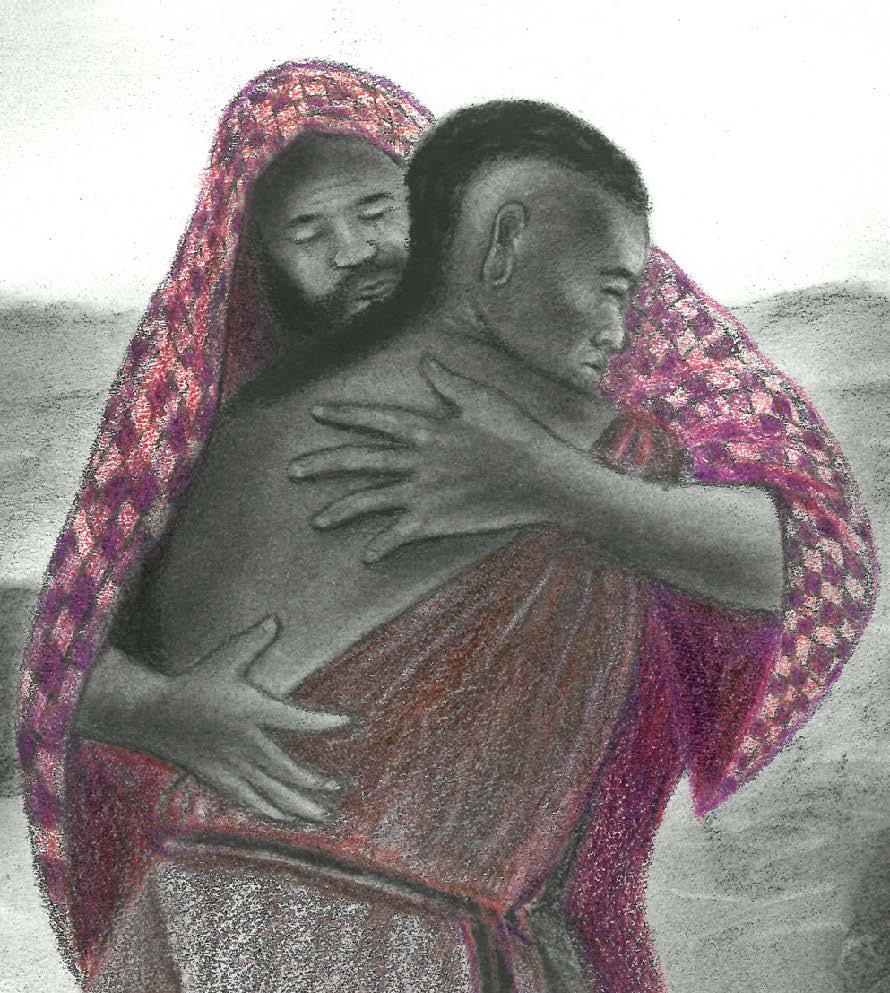 As the son comes home he is given three signs of sonship: a robe, a ring, and sandals on his feet. When the robe is wrapped around his shoulders, the father is covering his son with his love and protection. He is saying the boy is restored to his full position as a son. He is no longer clothed in rags, but now has the dignity of the righteous father. A ring is placed on the boy’s finger as a symbol of the father’s riches and the father’s authority being given to the son. The son can now exercise the father’s authority to do good in the land. And while the prodigal son had come home without any shoes, the Father says he is not be treated as a servant or a slave, but as a son. The sandals will not only protect his steps, but they are to help him to set out on a new way of life. The son who was lost is now found, and though he was dead in sin he is now brought to life. The community celebrates his return with a feast.
As the son comes home he is given three signs of sonship: a robe, a ring, and sandals on his feet. When the robe is wrapped around his shoulders, the father is covering his son with his love and protection. He is saying the boy is restored to his full position as a son. He is no longer clothed in rags, but now has the dignity of the righteous father. A ring is placed on the boy’s finger as a symbol of the father’s riches and the father’s authority being given to the son. The son can now exercise the father’s authority to do good in the land. And while the prodigal son had come home without any shoes, the Father says he is not be treated as a servant or a slave, but as a son. The sandals will not only protect his steps, but they are to help him to set out on a new way of life. The son who was lost is now found, and though he was dead in sin he is now brought to life. The community celebrates his return with a feast.
Living as Children of God
When you look at the whole scheme of the Lord’s Prayer it begins with the person of God, Our Father who Art in Heaven. Then it comes to the purity of God or the holiness of God. God’s relationship with us is a holy relationship. We call it holy love.
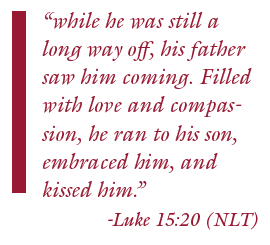 Once we return to the father we are not meant to keep sinning. We are not to stay destroyed in sin or to live a failing life. We are meant to live a victorious, holy life as true children of God. The Bible puts it clearly, “be ye holy for I am Holy.” In purifying our relationship with Him and our relationship with others, God invites us to be holy as He is holy. The Bible calls us to a life of holiness and living a life of total love. It is the best of what Christianity is intended to be. You ask me what holiness is. The best way of describing holiness is to love God with all your heart, mind, and strength and out of that vertical love with the Father you then have the horizontal love for your neighbor as yourself. This is the celebration of the Father’s love. It not only rescues us from sin and death, it moves us into a life of holiness.
Once we return to the father we are not meant to keep sinning. We are not to stay destroyed in sin or to live a failing life. We are meant to live a victorious, holy life as true children of God. The Bible puts it clearly, “be ye holy for I am Holy.” In purifying our relationship with Him and our relationship with others, God invites us to be holy as He is holy. The Bible calls us to a life of holiness and living a life of total love. It is the best of what Christianity is intended to be. You ask me what holiness is. The best way of describing holiness is to love God with all your heart, mind, and strength and out of that vertical love with the Father you then have the horizontal love for your neighbor as yourself. This is the celebration of the Father’s love. It not only rescues us from sin and death, it moves us into a life of holiness.

Robert Langat
BishopRev. Dr. Robert Langat is the bishop of Africa Gospel Church, Kenya. He has pastored congregations in Kenya and has served as a University Provost and college professor in the United States, Kenya, and Nigeria. He is a graduate of Kenya Highlands Evangelical University and holds an MA in Theology from Wesley Biblical Seminary and a master’s degree and a PhD from Drew University. His passions are teaching, preaching, and living the message of holiness.

 COPYRIGHT: This publication is published by C.S. Lewis Institute; 8001 Braddock Road, Suite 301; Springfield, VA 22151. Portions of the publication may be reproduced for noncommercial, local church or ministry use without prior permission. Electronic copies of the PDF files may be duplicated and transmitted via e-mail for personal and church use. Articles may not be modified without prior written permission of the Institute. For questions, contact the Institute: 703.914.5602 or email us.
COPYRIGHT: This publication is published by C.S. Lewis Institute; 8001 Braddock Road, Suite 301; Springfield, VA 22151. Portions of the publication may be reproduced for noncommercial, local church or ministry use without prior permission. Electronic copies of the PDF files may be duplicated and transmitted via e-mail for personal and church use. Articles may not be modified without prior written permission of the Institute. For questions, contact the Institute: 703.914.5602 or email us.
Speakers
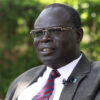
Robert Langat
Bishop
Team Members

Robert Langat
BishopRev. Dr. Robert Langat is the bishop of Africa Gospel Church, Kenya. He has pastored congregations in Kenya and has served as a University Provost and college professor in the United States, Kenya, and Nigeria. He is a graduate of Kenya Highlands Evangelical University and holds an MA in Theology from Wesley Biblical Seminary and a master’s degree and a PhD from Drew University. His passions are teaching, preaching, and living the message of holiness.



